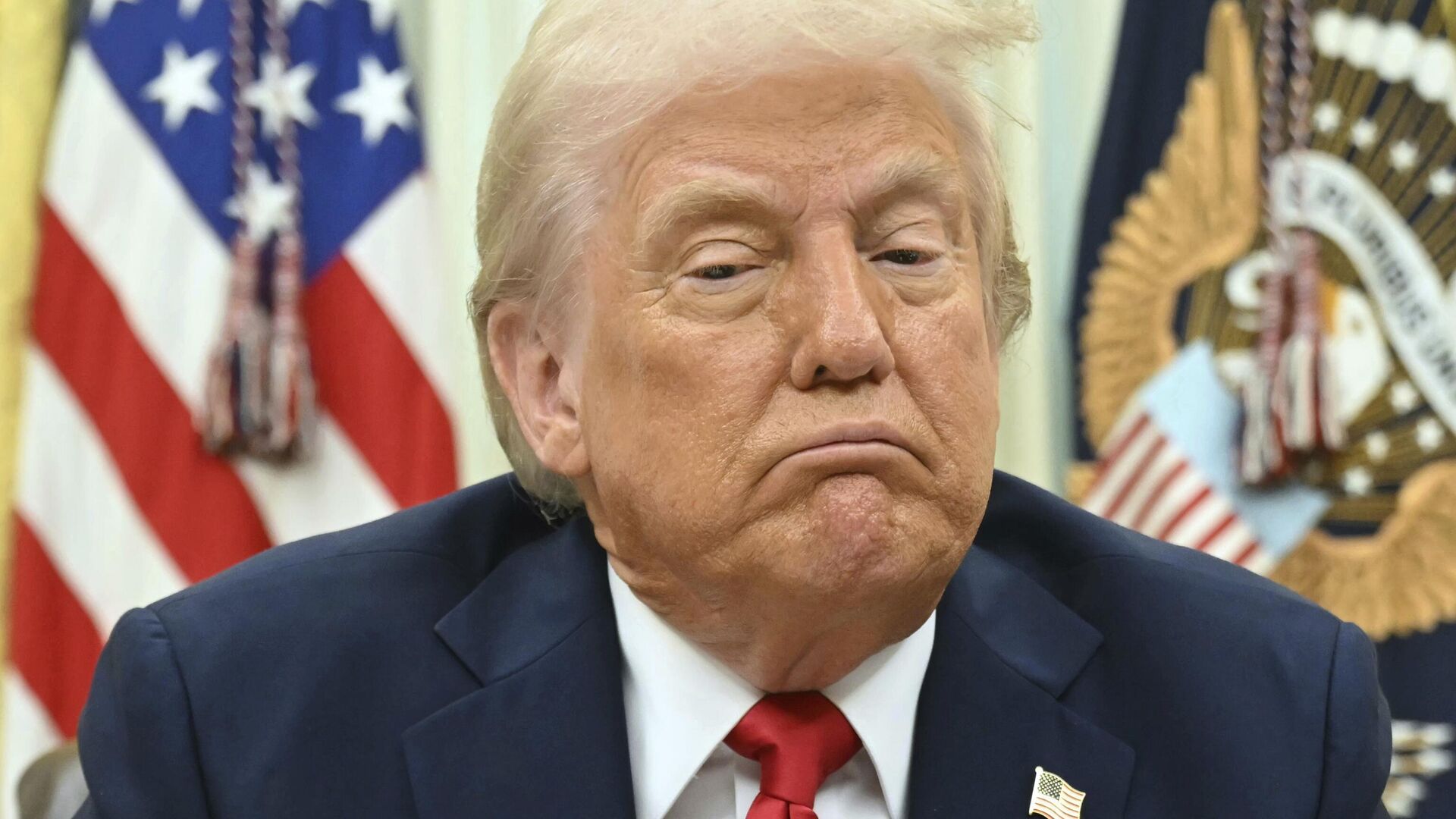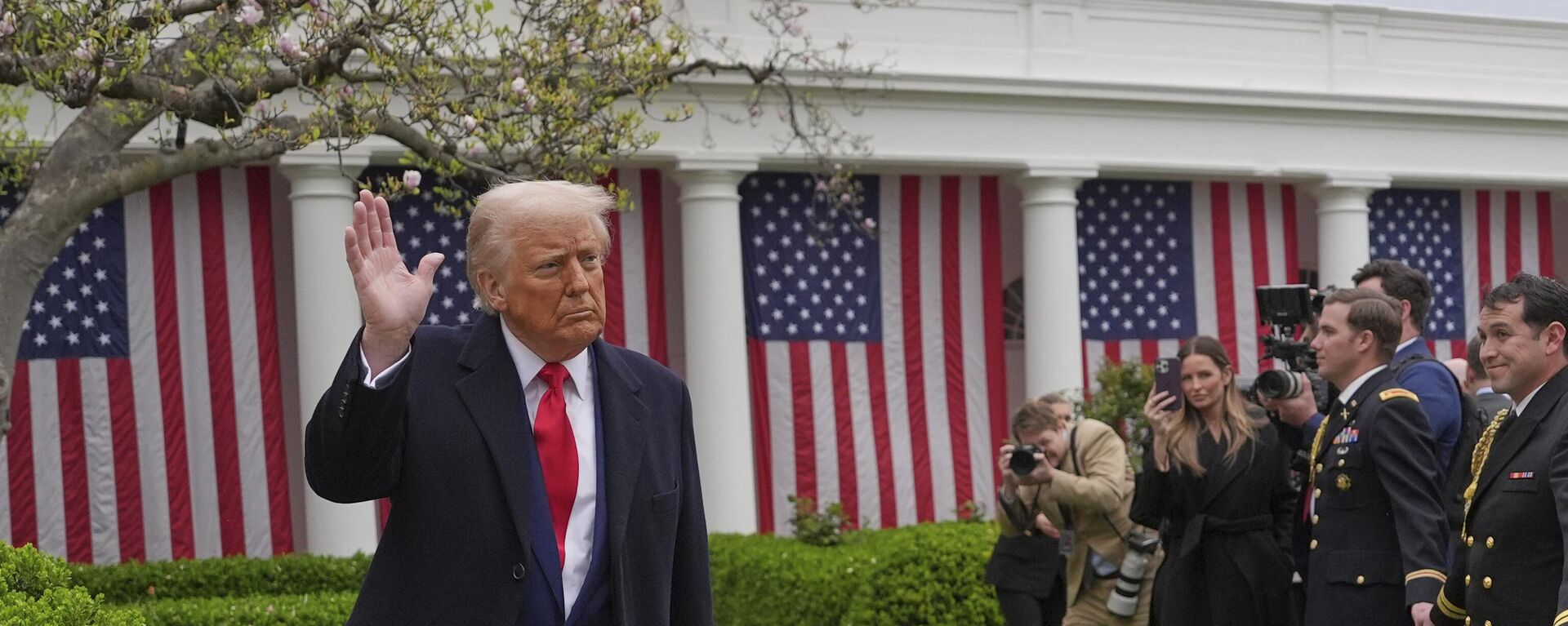https://sputniknews.in/20250524/trumps-trade-talk-vs-indias-bilateral-stand-9180425.html
Trump’s Trade Talk vs. India’s Bilateral Stand
Trump’s Trade Talk vs. India’s Bilateral Stand
Sputnik India
U.S. President Donald Trump claimed that the U.S. helped "settle" the conflict through trade. India, however, has consistently rejected this claim—asserting ceasefire was strictly bilateral, with no mediation or trade deals.
2025-05-24T20:14+0530
2025-05-24T20:14+0530
2025-05-24T20:14+0530
world news
india
donald trump
s. jaishankar
pakistan
us
operation sindoor
proxy war
war crimes
trade
https://cdn1.img.sputniknews.in/img/07e9/04/15/9006572_0:160:3072:1888_1920x0_80_0_0_0c6880ae197db467971ee27f39372641.jpg
India, however, has consistently rejected this claim—asserting the ceasefire was strictly bilateral, with no mediation or trade deals involved.The ongoing contradictory narrative between India and the US over the ceasefire with Pakistan has raised many questions about India’s foreign policy autonomy and its strategic relationship with the United States.Geopolitical expert Niranjan Marjani, fellow at the Kalinga Institute of Indo-Pacific Studies, told Sputnik India that India has consistently maintained that the ceasefire was directly negotiated with Pakistan, without any third-party mediation.He suggests these conflicting narratives stem from Trump’s style of diplomacy, marked by exaggerated claims.U.S. Pressure, No MediationDr. Anuradha Chenoy, former professor at Jawaharlal Nehru University (JNU), points out that while the U.S. initially refrained from intervening, pressure mounted as tensions escalated between two nuclear powers.While many countries may have contacted India and Pakistan to express concern during the escalation, that doesn’t imply mediation, Dr. Chenoy adds.Replicating Abraham Accords?Marjani further suggests that Trump may have tried to replicate the success of the Abraham Accords, in which several Arab countries formally recognised and established diplomatic relations with Israel, brokered by him during his first presidency in 2020.Trump’s Trade Claim Falls FlatTrump’s claim that trade negotiations with India helped broker peace has also been widely disputed.“Trump claimed that the US is currently engaged in negotiations with India on a free trade agreement. That’s inaccurate. India’s External Affairs Minister Dr. S. Jaishankar has categorically denied any trade links. There was no trade-related settlement,” Marjani says.Chenoy adds that India does not—and will not—trade away its security.Diplomatic Friction, Not FalloutThough Trump’s remarks haven’t led to a diplomatic rift, they have caused discomfort.“This irks India, which sees such comparisons as both inaccurate and diplomatically tone-deaf,” he says.Chenoy agrees, pointing out that Western discourse often “hyphenates” India and Pakistan—especially in security contexts. But India’s growing economic strength and strategic value are hard to ignore.India’s Sovereignty Non-NegotiableAt the core of India’s stance is the Simla Agreement, which mandates bilateral resolution of disputes with Pakistan without third-party mediation.Though Pakistan has suspended the 1972 Simla Agreement as part of a series of retaliatory actions in response to India's reaction to the Pahalgam attack, Marjani shares that India continues to uphold that agreement.Chenoy reinforced this, noting that India’s actions—both military and diplomatic—demonstrate autonomy.
https://sputniknews.in/20250511/india-rejects-us-attempt-to-hog-credit-for-de-escalation-with-pakistan-9104927.html
india
pakistan
us
Sputnik India
feedback.hindi@sputniknews.com
+74956456601
MIA „Rossiya Segodnya“
2025
Sangeeta Yadav
https://cdn1.img.sputniknews.in/img/07e6/0c/0f/110602_0:0:641:640_100x100_80_0_0_c298016a79eb02ef8caa9d1f688c12a5.jpg
Sangeeta Yadav
https://cdn1.img.sputniknews.in/img/07e6/0c/0f/110602_0:0:641:640_100x100_80_0_0_c298016a79eb02ef8caa9d1f688c12a5.jpg
News
en_IN
Sputnik India
feedback.hindi@sputniknews.com
+74956456601
MIA „Rossiya Segodnya“
Sputnik India
feedback.hindi@sputniknews.com
+74956456601
MIA „Rossiya Segodnya“
Sangeeta Yadav
https://cdn1.img.sputniknews.in/img/07e6/0c/0f/110602_0:0:641:640_100x100_80_0_0_c298016a79eb02ef8caa9d1f688c12a5.jpg
ceasefire, operation sindoor, pakistan news, pakistan violates ceasefire, trump news, trump modi, trump pakistan, trump kashmir, trump deescalation, india pakistan deescalation, indian strikes at paf bases, operation sindoor, india pakistan war, india pakistan latest updates, pakistan drone attack, tarrif, free trade agreement,
ceasefire, operation sindoor, pakistan news, pakistan violates ceasefire, trump news, trump modi, trump pakistan, trump kashmir, trump deescalation, india pakistan deescalation, indian strikes at paf bases, operation sindoor, india pakistan war, india pakistan latest updates, pakistan drone attack, tarrif, free trade agreement,
Trump’s Trade Talk vs. India’s Bilateral Stand
In the aftermath of Operation Sindoor and rising tensions between India and Pakistan, US President Donald Trump claimed that the US helped "settle" the conflict through trade.
India, however, has consistently rejected this claim—asserting the ceasefire was strictly bilateral, with no mediation or trade deals involved.
The ongoing contradictory narrative between India and the US over the ceasefire with Pakistan has raised many questions about India’s foreign policy autonomy and its strategic relationship with the United States.
Geopolitical expert Niranjan Marjani, fellow at the Kalinga Institute of Indo-Pacific Studies, told Sputnik India that India has consistently maintained that the
ceasefire was directly negotiated with Pakistan, without any third-party mediation.
He suggests these conflicting narratives stem from
Trump’s style of diplomacy, marked by exaggerated claims.
“Trump has made exaggerated claims before—such as suggesting buying Greenland or renaming the Gulf of Mexico. His statements often lack credibility and are more about projecting influence than reflecting facts,” Marjani tells Sputnik India.
U.S. Pressure, No Mediation
Dr. Anuradha Chenoy, former professor at Jawaharlal Nehru University (JNU), points out that while the U.S. initially refrained from intervening, pressure mounted as tensions escalated between two nuclear powers.
“The Trump administration began to apply pressure because no one wanted a third conflict zone to emerge alongside Ukraine and the Middle East. But the final ceasefire decision was taken bilaterally between Indian and Pakistani Directors General of Military Operations (DGMOs),” Dr. Chenoy tells Sputnik India.
While many countries may have contacted India and Pakistan to express concern during the escalation, that doesn’t imply mediation, Dr. Chenoy adds.
“There may be external pressure to de-escalate, but no foreign power dictates Indian policy,” Chenoy says.
Replicating Abraham Accords?
Marjani further suggests that Trump may have tried to replicate the success of the Abraham Accords, in which several Arab countries formally recognised and established diplomatic relations with
Israel, brokered by him during his first presidency in 2020.
“But the India-Pakistan conflict isn’t a quick-fix situation. It’s deeply rooted in complex history and regional geopolitics. You can’t apply the same diplomatic formula,” Marjani explains.
Trump’s Trade Claim Falls Flat
Trump’s claim that trade negotiations with India helped broker peace has also been widely disputed.
“Trump claimed that the
US is currently engaged in
negotiations with India on a free trade agreement. That’s inaccurate. India’s External Affairs Minister Dr.
S. Jaishankar has categorically denied any trade links. There was no trade-related settlement,” Marjani says.
Chenoy adds that India does not—and will not—trade away its security.
“Trade and terrorism are two entirely different issues. There will be pressure from outside, but the internal decisions will be internal decisions. It doesn't get so simplified that the US will say something and India will act and jump. No, India will take their own calibrated decision and what they can negotiate with the US too,” Chenoy says.
Diplomatic Friction, Not Fallout
Though Trump’s remarks haven’t led to a diplomatic rift, they have caused discomfort.
“By claiming credit, Trump placed India and Pakistan on equal footing in his ceasefire remarks, ignoring the vast differences in democratic values, global standing, and economic scale,” Marjani says.
“This irks India, which sees such comparisons as both inaccurate and diplomatically tone-deaf,” he says.
Chenoy agrees, pointing out that Western discourse often “hyphenates” India and Pakistan—especially in security contexts. But India’s growing economic strength and strategic value are hard to ignore.
India’s Sovereignty Non-Negotiable
At the core of India’s stance is the Simla Agreement, which mandates bilateral resolution of disputes with Pakistan without third-party mediation.
Though Pakistan has suspended the 1972 Simla Agreement as part of a series of retaliatory actions in response to India's reaction to the Pahalgam attack, Marjani shares that India continues to uphold that agreement.
“India is not giving any opportunity to any country to undermine and interfere in its sovereignty,” Marjani emphasises.
Chenoy reinforced this, noting that India’s actions—both military and diplomatic—demonstrate autonomy.
“India has shown through military actions and diplomatic clarity—like in Operation Sindoor—that it will make independent, sovereign decisions. India’s sovereignty is not negotiable,” Chenoy adds.



